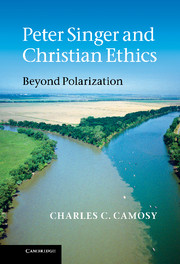Chapter 2 - Euthanasia and the end of life
Published online by Cambridge University Press: 05 August 2012
Summary
[I]s it reasonable to hold that the doctor who gives the injection is a murderer who deserves to go to jail, whereas the doctor who decides not to administer antibiotics is practicing good and compassionate medicine?
Peter Singer, Practical EthicsEuthanasia in the strict sense is understood to be an action or omission which of itself and by intention causes death.
Pope John Paul ii, Evangelium VitaeINTRODUCTION
If abortion is the first issue which jumps to mind when thinking about why a project like this one seems counter-intuitive, then end-of-life issues might come next. Peter Singer's championing of euthanasia seems hopelessly at odds with an ethic that understands such killing to be intrinsically evil. Indeed, the Church claims that euthanasia is “hostile to life itself” and part of a violent culture of death. And Singer's support of euthanasia has been resisted, not only by Christians, but by secular groups as well. A recent example was the advocacy group Not Dead Yet sending a letter to the editor of the Sunday New York Times Magazine claiming that Singer devalues the lives of those with special needs. Nor has the blowback from such groups been limited to the United States. In an appendix to the second edition of Practical Ethics, which he entitled “On Being Silenced in Germany,” Singer details several examples where his invitations to present his scholarship were withdrawn under pressure from these groups. Sometimes his speaking events were canceled, and on occasions where they were allowed to go ahead, Singer was often whistled at or shouted down. On one occasion, much of the crowd simply repeated the chant “Singer raus ! Singer raus !” (Get out, Singer, get out!) The chant was so loud and sustained that he was forced to abandon his presentation.
Despite a motivated coalition of both Christians and secularists against him, Singer maintains a very strong and consistent position on euthanasia and end-of-life issues.
- Type
- Chapter
- Information
- Peter Singer and Christian EthicsBeyond Polarization, pp. 41 - 82Publisher: Cambridge University PressPrint publication year: 2012

